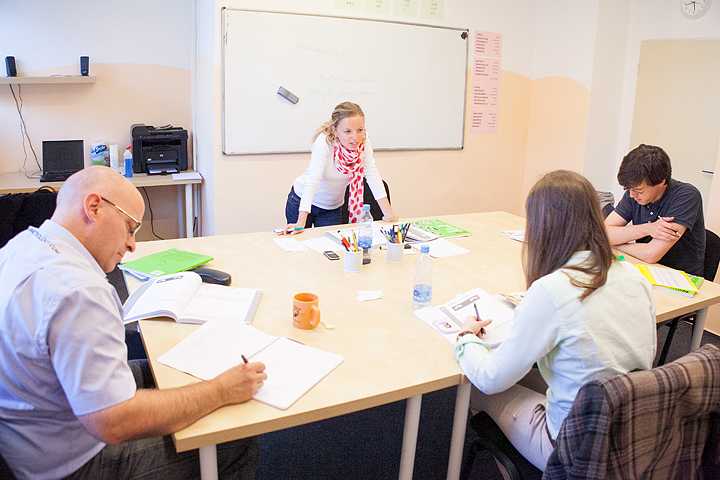 This year we were also lucky with the weather, a really intense one, but fortunately our classroom has two and more fans that evoke a sense of beach and ocean. And it becomes much better place to work. For these cases, it is very appropriate to include activities such as paper domino, memory game/pairs or composing a cut-up article. The demanding nature of these activities immediately climbs up a level when students try to put the pieces together while chasing them flying around the classroom. These activities are a real challenge not only for students but for teachers as well.
This year we were also lucky with the weather, a really intense one, but fortunately our classroom has two and more fans that evoke a sense of beach and ocean. And it becomes much better place to work. For these cases, it is very appropriate to include activities such as paper domino, memory game/pairs or composing a cut-up article. The demanding nature of these activities immediately climbs up a level when students try to put the pieces together while chasing them flying around the classroom. These activities are a real challenge not only for students but for teachers as well.
It is useful to adjust some basic phrases for the hot weather, which is not an exception during the summer courses. For example the question "How are you?" we teach students besides the answer „Okay." also "I'm hot.". Very important is the phrase: "I need some water.”, which most students mix up with the phrase "I need a beer." On very hot days, the students often call for a break using the phrase: "Please break." Yet this must not sway the teacher.
Let´s stop at the most frequent phrase "How are you?" Of course, at the beginning of the course students reply politely that they are well or even very well (regardless their stomach problems, headaches or flu symptoms). Gradually they get bolder and need to learn the word „tired / exhausted." Usually all students are „well“ the first two days, next week they are “tired” and to the end of the course they already have a headache or a hangover, especially those of the younger generation. An experienced teacher doesn´t ask this question at the beginning of each lesson anymore. A question such as: “How many beers did you drink yesterday? " or simply," So how many today?” is enough. At the end of the course students start showing the number of beers on their fingers already at the door, provided the number of fingers is sufficient. In these cases it is advisable to choose an activation method and appropriately divide students during group tasks into pairs. You might say that you just place a tired student next to an active student, but it does not work this way. An active student works like a dog for the passive one. On the contrary, it is good to create a tired section and an active one. If necessary, you can assign the active group an additional task and the passive one gets fans and coffee. The worst case scenario is hearing the answer: "I'm sick / ill, I have a cold. " to the question " How are you ? " It is then clear that a snowball effect is underway. On the other hand, your students will expand the vocabulary of phrases that can be summed under the title "At the doctor´s“. In class you can then create a group of the healthy and the sick, roleplay doctor and patients’ / field hospital activities… the imagination is endless.
But seriously. The two week Czech course in the CLT provides students and teachers with an intense and unforgettable experience with the Czech language. For me as a teacher it is wonderful to see how students develop, improve, what progress they make in the Czech language, for example their answers to this very basic question: "How are you?". Each student brings a different energy to the class, a piece of their culture and their personalities. The class connects such a great multicultural hotchpotch that is fun to teach. And when you have the right summer weather, you really feel like on holidays somewhere abroad, which is probably what I enjoy most about my job.

